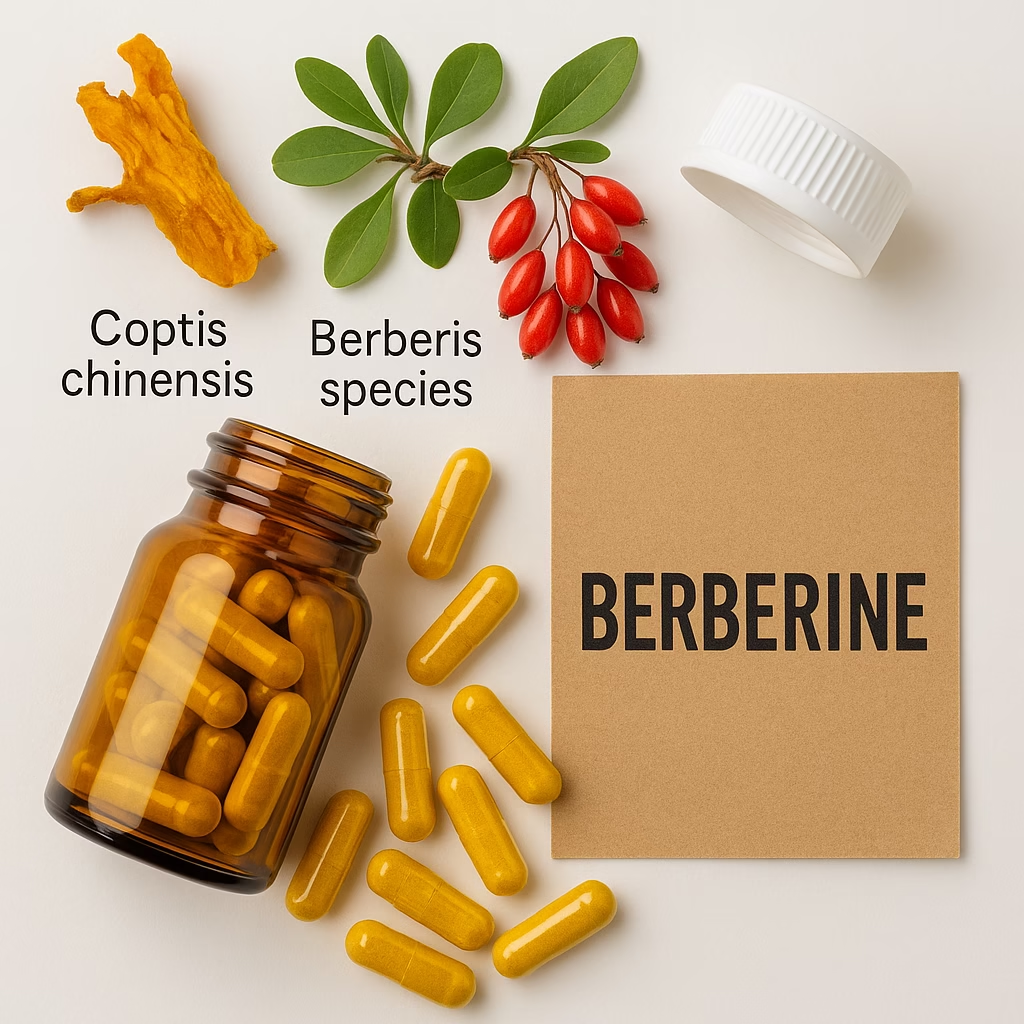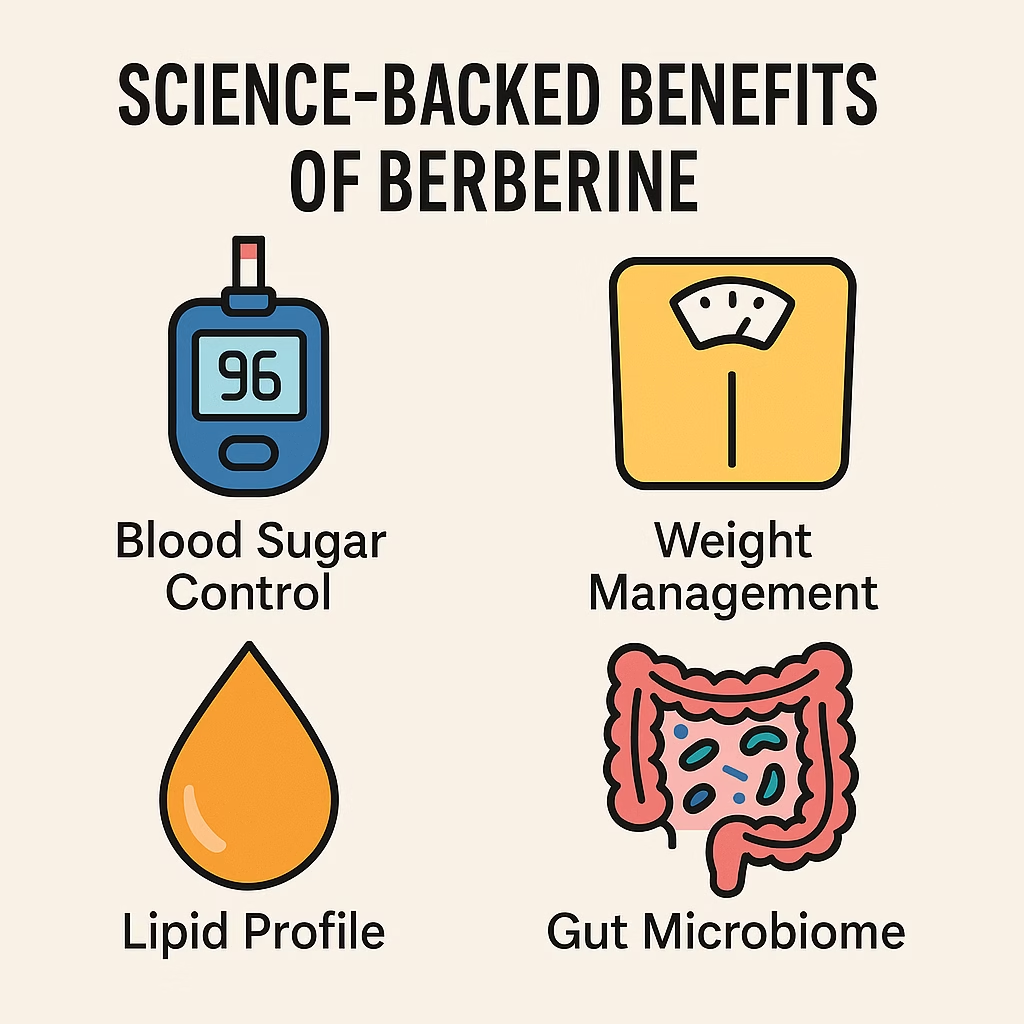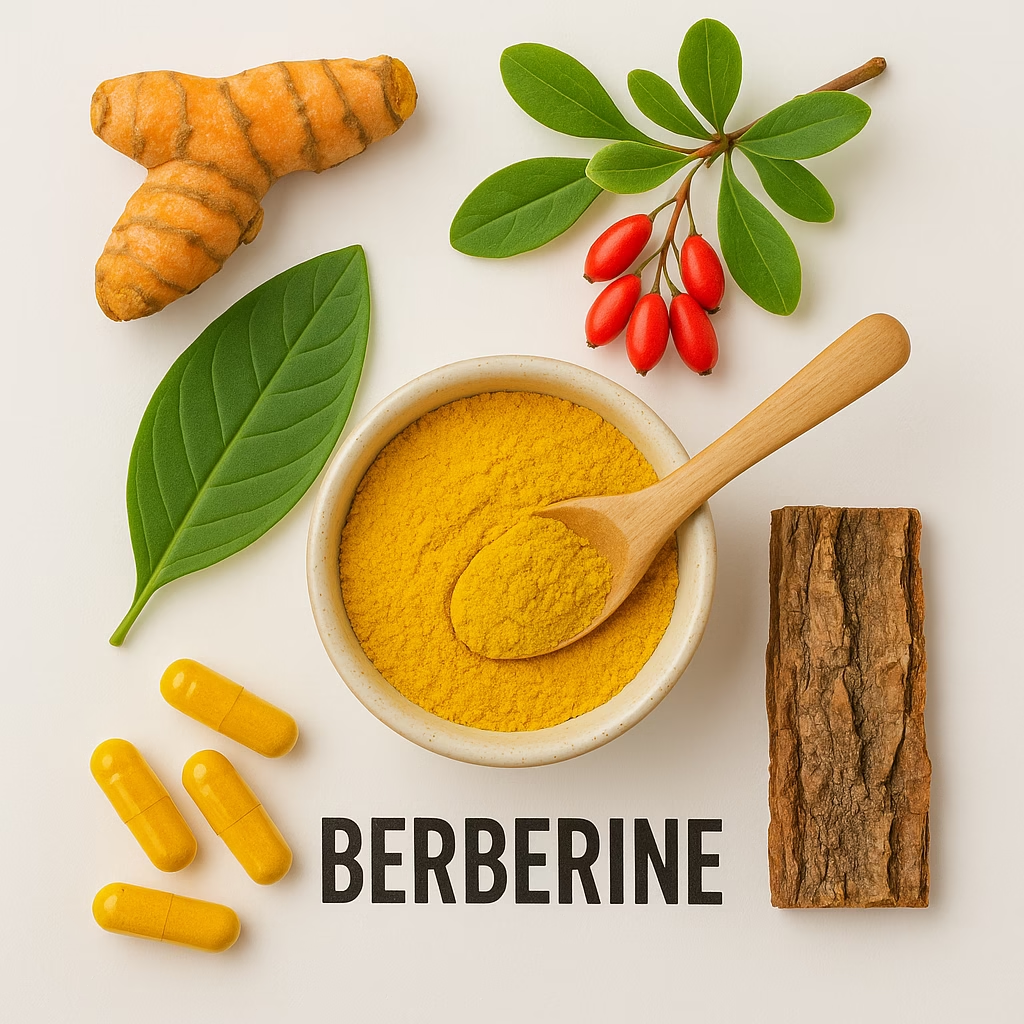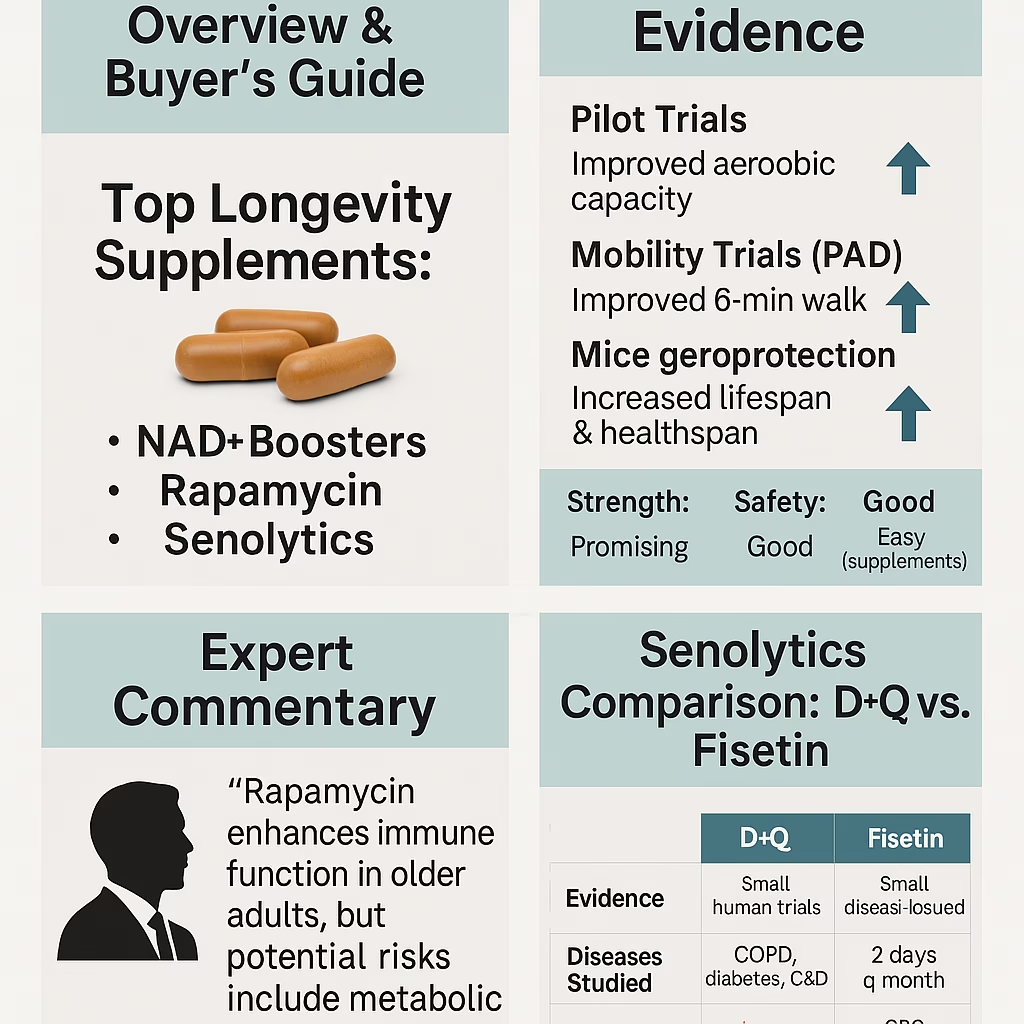Berberine Supplement: The Ultimate Science-Backed Guide (2025 Edition)
Quick Summary
- What it is: Berberine is a plant-derived alkaloid from species like Coptis chinensis and Berberis vulgaris.
- Main Benefits: Lowers blood sugar, improves insulin sensitivity, supports weight loss, reduces LDL cholesterol and triglycerides, and enhances gut microbiome balance.
- How it works: Activates AMPK (“metabolic master switch”), improves insulin signaling, reduces inflammation, and modulates gut bacteria.
- Dosage: 500–1500 mg/day, divided into 2–3 doses. Best taken with meals for blood sugar control.
- Safety: Generally safe, with mild GI side effects (bloating, diarrhea). Avoid if pregnant, breastfeeding, or on certain medications (antidiabetics, anticoagulants).
- Comparison: Similar efficacy to metformin in blood sugar control, synergistic with curcumin, green tea extract, and resveratrol.
- Who benefits most: People with type 2 diabetes, prediabetes, metabolic syndrome, high cholesterol, obesity, or gut imbalance.
In short: Berberine is one of the most research-backed natural supplements for metabolic health, offering results comparable to pharmaceuticals, with added gut and anti-inflammatory benefits.

Introduction to Berberine
What is Berberine?
Berberine is a bioactive alkaloid compound naturally present in several medicinal plants, particularly in the Berberis family (including Berberis vulgaris, also known as barberry). It is also found in Coptis chinensis (Chinese goldthread), Hydrastis canadensis (goldenseal), and Phellodendron amurense (Amur cork tree). Characterized by its rich yellow color, berberine has been used for centuries as a traditional medicine across Asia and the Middle East.
Modern scientific interest in berberine skyrocketed when researchers discovered that it can have drug-like effects in the body, particularly for regulating blood sugar, cholesterol, and weight. Its broad range of actions has led scientists to label berberine as one of the most powerful natural nutraceuticals available today.
Traditional Origins: Roots in Chinese and Ayurvedic Medicine
In Traditional Chinese Medicine (TCM), berberine was used primarily for gastrointestinal issues. Herbalists prescribed decoctions of Coptis chinensis and Phellodendron bark to treat diarrhea, dysentery, and gut infections. The compound was also used topically for skin and eye conditions due to its antimicrobial effects.
In Ayurveda, the Indian system of traditional medicine, barberry (Daruharidra) has been revered as a “blood purifier” and digestive aid. Practitioners used it for jaundice, liver conditions, and as a tonic for metabolic balance.
Across the Middle East and North Africa, barberry fruit and extracts were consumed for cooling the blood, improving digestion, and managing fever. This long legacy across multiple cultures illustrates berberine’s versatility as a healing agent.
Why Berberine is Gaining Global Attention Today
The global wellness market has recently turned its spotlight on berberine because of its science-backed potential to address modern epidemics like type 2 diabetes, obesity, and cardiovascular disease. Unlike many herbal supplements with anecdotal claims, berberine has been rigorously tested in hundreds of clinical trials.
Researchers and clinicians often call it “nature’s metformin” because it activates the same metabolic pathways as the prescription diabetes drug. Yet, berberine offers unique advantages, such as its influence on the gut microbiome and anti-inflammatory properties.
Additionally, berberine has gained traction due to:
- Its accessibility as an over-the-counter supplement.
- Its affordability compared to pharmaceuticals.
- Growing interest in plant-based medicine and natural alternatives.
- Positive media coverage and patient testimonials worldwide.
With such widespread applications, it’s no wonder that berberine has become one of the most discussed and recommended supplements in the functional and integrative medicine space.
Science-Backed Health Benefits of Berberine
Berberine has been shown to positively affect multiple systems in the body, particularly in the realm of metabolic health. Below, we break down its most compelling evidence-based benefits.
Blood Sugar Control & Type 2 Diabetes
Berberine’s strongest and most consistent effects are seen in the regulation of blood glucose. Numerous studies have found that berberine lowers both fasting blood sugar and postprandial (after-meal) glucose levels, making it a promising natural agent for type 2 diabetes management.
- A landmark 2008 randomized clinical trial published in Metabolism compared berberine (1,500 mg/day) to metformin in type 2 diabetics. The results showed that berberine reduced fasting blood glucose and HbA1c (a long-term blood sugar marker) as effectively as metformin.
- A 2021 meta-analysis of 46 trials reported that berberine significantly reduced HbA1c, fasting glucose, and insulin resistance markers, often enhancing the effects of lifestyle interventions.
- Some research suggests that berberine may also help individuals with prediabetes, potentially delaying or preventing progression to type 2 diabetes.
What makes berberine particularly interesting is that it not only lowers blood sugar but also improves insulin sensitivity, meaning the body can use insulin more efficiently. This is crucial because insulin resistance lies at the root of both diabetes and obesity.
Weight Management & Fat Metabolism
Berberine has attracted attention as a weight management tool because of its ability to influence fat storage and fat burning. Unlike many weight-loss supplements that focus only on appetite suppression, berberine acts at a deeper metabolic level.
- A 2012 clinical study published in Phytomedicine followed obese patients who took 500 mg of berberine three times daily. After 12 weeks, participants experienced an average weight loss of 5 pounds, reduced BMI, and smaller waist circumference.
- Berberine reduces lipogenesis, the body’s process of creating new fat, while stimulating lipolysis, the breakdown of existing fat stores.
- It influences adipokines, hormones secreted by fat tissue, which can regulate hunger, inflammation, and insulin sensitivity.
Another important factor is its impact on visceral fat, the deep abdominal fat linked to diabetes, heart disease, and metabolic syndrome. Studies indicate berberine helps reduce this dangerous fat more effectively than superficial fat, making it particularly beneficial for long-term metabolic health.
Cholesterol & Lipid Profile Improvement
High cholesterol and triglycerides are major risk factors for cardiovascular disease. Berberine has shown strong potential to improve lipid markers.
- Berberine works by upregulating LDL receptors in the liver, allowing the body to clear “bad cholesterol” more efficiently.
- Clinical studies have shown reductions in LDL cholesterol by up to 25% and triglycerides by 30% or more.
- HDL cholesterol (the “good” cholesterol) tends to increase modestly, providing additional cardiovascular protection.
For patients who cannot tolerate statins due to side effects, berberine may represent a natural alternative. Some studies even suggest berberine’s lipid-lowering effects are comparable to statins, though more research is needed before it could be considered a replacement.
Gut Microbiome Modulation
The gut microbiome plays a critical role in digestion, immune health, and metabolism. Berberine has a unique ability to reshape gut bacteria composition, which partly explains its metabolic benefits.
- Berberine promotes the growth of butyrate-producing bacteria, which produce short-chain fatty acids that support gut lining integrity and reduce inflammation.
- It helps reduce the prevalence of endotoxin-producing bacteria, which can cause low-grade inflammation and insulin resistance.
- Emerging evidence suggests berberine’s microbiome modulation may also support mental health by improving the gut-brain axis.
By targeting the gut microbiome, berberine offers a holistic approach to metabolic health that goes beyond blood sugar and cholesterol alone.

Mechanisms of Action
Understanding how berberine works is key to appreciating its wide-ranging benefits. Unlike many supplements that act on a single pathway, berberine has multi-targeted mechanisms that influence cellular energy, metabolism, inflammation, and gut health.
AMPK Activation: The “Metabolic Master Switch”
One of the most fascinating discoveries about berberine is its ability to activate AMP-activated protein kinase (AMPK), often described as the body’s “metabolic master switch.” AMPK regulates how cells generate and use energy.
When AMPK is activated:
- Glucose uptake in muscles increases, helping lower blood sugar.
- Fat storage in the liver decreases, preventing fatty liver disease.
- Fat burning rises, supporting weight management.
- Mitochondrial health improves, enhancing energy production.
This is the same pathway targeted by metformin, one of the most widely prescribed diabetes drugs. Unlike stimulants that “burn fat” by raising adrenaline or heart rate, berberine works at the cellular level to rebalance metabolism.
Insulin Sensitivity Enhancement
Insulin resistance is a major driver of diabetes and obesity. In this condition, cells stop responding effectively to insulin, leading to high blood sugar and excessive fat storage. Berberine improves insulin sensitivity in several ways:
- Enhancing the number and function of insulin receptors on cell surfaces.
- Promoting better glucose transport into cells, where it can be used for energy.
- Reducing hepatic glucose production, meaning the liver releases less sugar into the bloodstream.
This makes berberine especially valuable for people with prediabetes or metabolic syndrome.
Anti-inflammatory and Antioxidant Effects
Chronic inflammation contributes to heart disease, diabetes, obesity, and even neurodegenerative disorders. Berberine has demonstrated anti-inflammatory and antioxidant activity in both animal and human studies.
- Reduces pro-inflammatory cytokines such as TNF-α and IL-6.
- Lowers C-reactive protein (CRP), a marker of systemic inflammation.
- Neutralizes free radicals that damage cells and DNA.
These effects not only help with metabolic health but may also slow aging-related diseases.
Here is a list of a few available Products in Market
Gut Microbiota Modulation
Berberine’s impact on the microbiome deserves special attention. Unlike antibiotics that indiscriminately kill bacteria, berberine selectively reshapes gut flora.
- Increases beneficial bacteria such as Akkermansia muciniphila, linked to improved insulin sensitivity and weight loss.
- Decreases harmful bacteria that release endotoxins and drive inflammation.
- Strengthens the gut barrier, reducing “leaky gut” and systemic immune activation.
This makes berberine not just a metabolic regulator, but also a gut health optimizer.
Dosage, Timing, and Best Practices
Getting the right dose of berberine is essential for achieving benefits while minimizing side effects.
Standard Dosages (500–1500 mg/day)
Most clinical studies use a daily dose between 500 and 1500 mg, often divided into two or three smaller servings.
- 500 mg, 2–3 times daily is a typical recommendation.
- Higher doses may offer stronger effects but are more likely to cause gastrointestinal upset.
Because berberine has a short half-life (~5 hours), spreading doses across the day ensures stable blood levels.
With or Without Meals?
- Taking berberine with meals is generally recommended, as it reduces post-meal blood sugar spikes.
- For those using it primarily for weight management, taking a dose 30 minutes before meals may help with appetite control.
Best Forms of Berberine
Not all berberine supplements are created equal.
- Berberine HCl: The most common and cost-effective form.
- Liposomal berberine: Encapsulated for improved absorption.
- Berberine phytosome: Bound with phospholipids for better bioavailability.
- Combinations with silymarin (milk thistle): Enhance absorption and support liver function.
Consumers should look for products that are third-party tested for purity and potency, since quality can vary widely among brands.
If this part caught your eye, wait till you see how it connects with “AI-Powered Personalized Nutrition Trends 2025: The Ultimate Guide” — check it out here.

Safety, Side Effects, and Drug Interactions
Berberine is generally considered safe when taken at recommended dosages, but like any active compound, it can have side effects and interactions.
Common Side Effects
The most frequently reported side effects are gastrointestinal and usually mild:
- Diarrhea
- Constipation
- Stomach cramps
- Gas and bloating
These typically improve after one to two weeks of regular use as the body adapts. Starting with a lower dose and gradually increasing can reduce discomfort.
Drug Interactions
Berberine can interact with several types of medication because it affects the cytochrome P450 enzyme system and P-glycoprotein transporters, which regulate drug metabolism.
- Antidiabetic medications (metformin, insulin, sulfonylureas): Can cause excessive drops in blood sugar if combined.
- Antihypertensives: May intensify blood pressure-lowering effects.
- Anticoagulants (e.g., warfarin): Could increase bleeding risk.
- Certain antibiotics and antifungals: May alter absorption and clearance.
Anyone on prescription medication should consult their healthcare provider before starting berberine.
Who Should Avoid Berberine?
- Pregnant or breastfeeding women: Safety has not been established.
- Infants and small children: Risk of kernicterus (a rare but serious condition).
- Individuals on multiple prescription drugs: Risk of interaction is higher.
Comparison with Other Supplements and Drugs
Berberine is often compared to other compounds due to its broad spectrum of benefits. Let’s examine how it stacks up.
Berberine vs. Metformin
Metformin is the gold standard for type 2 diabetes management. Interestingly, berberine works through similar mechanisms (AMPK activation and reduced liver glucose production).
- Efficacy: Clinical studies show berberine is nearly as effective as metformin in lowering blood sugar.
- Side effects: Both can cause gastrointestinal issues, but some patients tolerate berberine better.
- Availability: Metformin requires a prescription, while berberine is available as a dietary supplement.
For individuals who cannot take metformin, berberine may offer a natural alternative, though medical supervision is always advised.
Berberine vs. Curcumin
Curcumin, the active compound in turmeric, is renowned for its anti-inflammatory and antioxidant effects.
- Curcumin excels in reducing inflammation and supporting joint, brain, and cardiovascular health.
- Berberine is stronger in regulating glucose and lipid metabolism.
- Together, they offer synergistic benefits: metabolic regulation plus anti-inflammatory support.
Berberine vs. Green Tea Extract (EGCG)
Green tea extract is popular for weight loss and antioxidant benefits, primarily due to its compound EGCG (epigallocatechin gallate).
- EGCG enhances fat oxidation during exercise.
- Berberine lowers blood sugar, insulin resistance, and cholesterol.
- When combined, they provide comprehensive support for weight management and cardiometabolic health.
Berberine vs. Resveratrol
Resveratrol, found in red wine and grapes, is known for activating SIRT1 pathways linked to longevity.
- Both berberine and resveratrol influence cellular energy and metabolism.
- Berberine acts mainly through AMPK, while resveratrol targets sirtuins.
- Together, they may create a synergistic anti-aging effect by addressing multiple longevity pathways.

Latest Research on Berberine (2019–2025)
The past decade has seen an explosion of research on berberine. Between 2019 and 2025, dozens of systematic reviews and clinical trials have added new depth to our understanding of this compound.
- 2020 Chinese Clinical Trial: Published in Diabetes Care, this trial followed over 300 patients with type 2 diabetes for 12 weeks. Participants taking berberine experienced a 0.9% reduction in HbA1c, similar to the effects seen with metformin.
- 2021 U.S. Weight Loss Study: In a randomized trial of overweight adults, those taking berberine lost 5–7 pounds over 3 months, along with reduced waist circumference and improved insulin sensitivity.
- 2022 Meta-analysis in Frontiers in Pharmacology: Reviewed 46 trials and concluded berberine significantly improves fasting blood glucose, HbA1c, triglycerides, and LDL cholesterol, especially when combined with lifestyle interventions.
- 2023 Cardiovascular Study in Phytomedicine: Found that berberine supplementation lowered C-reactive protein (CRP) and improved vascular function, supporting its role in heart health.
- 2024 Systematic Review in Nutrients: Highlighted berberine’s dual role as both a glucose regulator and gut microbiome modulator, making it unique among nutraceuticals.
- 2025 Ongoing Research: Early reports suggest berberine may support neuroprotection, with potential applications in preventing Alzheimer’s disease and improving cognitive health.
Taken together, these findings reinforce berberine as a multifunctional compound with applications that go far beyond diabetes and cholesterol management.
Think you’ve got this covered? Test yourself with my deep dive on “Ashwagandha Benefits Backed by Science: Stress Relief, Better Sleep & Mood Boost (2025 Guide)” — you might be surprised

Expert Opinions and Perspectives
Functional Medicine Practitioners
Dr. Mark Hyman, a leading figure in functional medicine, describes berberine as a “game-changer in natural metabolic support.” He frequently prescribes it to patients with prediabetes, insulin resistance, or metabolic syndrome who prefer a natural alternative to prescription drugs.
Endocrinologists and Metabolic Specialists
Many endocrinologists view berberine as a promising adjunct therapy. While they emphasize that it should not replace prescribed medication without supervision, they acknowledge its strong potential for patients who cannot tolerate standard treatments.
Dr. David S. Ludwig, an endocrinologist and professor at Harvard, notes that berberine is “one of the few natural supplements with clinical evidence comparable to pharmaceuticals in diabetes care.”
Nutritionists and Holistic Health Experts
Holistic nutritionists often recommend berberine as part of a metabolic stack, combined with:
- Curcumin (for inflammation)
- Omega-3 fatty acids (for cardiovascular health)
- Resveratrol (for longevity support)
They emphasize that supplements like berberine are most effective when combined with whole-food diets, regular exercise, and stress management practices.
Practical Tips for Users
Choosing a High-Quality Supplement
When selecting a berberine product:
- Look for 97% standardized berberine HCl for potency.
- Check for third-party lab testing to confirm purity and absence of contaminants.
- Avoid products with unnecessary fillers or proprietary blends that don’t disclose dosage.
How to Incorporate Berberine Into Daily Life
- Take 500 mg with breakfast, lunch, and dinner for optimal coverage.
- Pair with fiber-rich meals to maximize gut microbiome benefits.
- If your goal is weight loss, try timing one dose before meals to help regulate appetite.
Stacking with Other Supplements
For enhanced results, consider combining berberine with:
- Curcumin → Anti-inflammatory support.
- Green Tea Extract (EGCG) → Fat oxidation boost.
- Resveratrol → Longevity and anti-aging benefits.
- Omega-3s → Cardiovascular and anti-inflammatory synergy.
If this part caught your eye, wait till you see how it connects with “Top Longevity Supplements 2025: Evidence, Expert Insights, and the Future of Anti-Aging Science” — check it out here.
FAQs on Berberine
1. How long does it take to see results with berberine?
Most people notice improvements in blood sugar within 2–4 weeks, while changes in cholesterol and weight may take 8–12 weeks.
2. Can berberine replace metformin?
In some cases, yes—studies show berberine can be as effective as metformin. However, it should only be used as a replacement under medical supervision.
3. Is berberine safe for long-term use?
Research supports safety for up to 12 months of continuous use. Some practitioners recommend cycling (e.g., 8 weeks on, 2 weeks off) to reduce the risk of tolerance.
4. Can I take berberine if I don’t have diabetes?
Yes. Many people use berberine for cholesterol management, weight loss, gut health, and overall metabolic balance.
5. Does berberine interact with caffeine or alcohol?
No serious interactions are known, but combining with excessive alcohol may reduce liver health benefits.
6. Can athletes take berberine?
Yes. By activating AMPK, berberine can improve endurance, fat metabolism, and recovery, making it appealing for athletes and biohackers.
7. Is berberine safe for older adults?
Yes, but since older adults are more likely to be on multiple medications, a healthcare provider should evaluate for drug interactions.
8. Can berberine improve gut health conditions like IBS or leaky gut?
Yes, studies suggest berberine helps restore microbial balance and strengthens the intestinal barrier, which can benefit IBS and leaky gut sufferers.
9. Does berberine support brain health?
Preliminary animal studies suggest neuroprotective effects. Human trials are still limited, but researchers are exploring berberine’s role in Alzheimer’s and cognitive decline.
10. What’s the best way to maximize berberine absorption?
Take with meals containing healthy fats, or choose liposomal/phytosome forms for better bioavailability.
11. Can berberine be combined with intermittent fasting?
Yes. In fact, the AMPK activation from fasting and berberine may have synergistic effects on metabolism.
12. Is berberine safe for vegetarians and vegans?
Yes, berberine itself is plant-derived. Just check capsules for non-vegan gelatin.
Conclusion
Berberine stands out as one of the most scientifically validated natural supplements available today. Rooted in centuries of traditional use and backed by modern clinical trials, it offers broad benefits for blood sugar regulation, weight management, cholesterol improvement, and gut health.
What makes berberine particularly exciting is its ability to act on multiple pathways—AMPK activation, insulin sensitivity, anti-inflammatory signaling, and microbiome modulation—giving it a powerful, holistic impact on metabolic health.
For those struggling with prediabetes, type 2 diabetes, obesity, or high cholesterol, berberine provides a natural yet potent option. For healthy individuals, it can serve as a preventive tool to maintain optimal metabolic balance and longevity.
That said, berberine is not a silver bullet. Its best effects are seen when combined with diet, exercise, and lifestyle changes. Moreover, because of its interactions with certain medications, consultation with a healthcare professional is strongly advised.
As research continues to expand, berberine’s role in neuroprotection, longevity, and integrative medicine is likely to grow even further. In 2025, it remains one of the most exciting natural compounds bridging the gap between traditional medicine and modern science.





